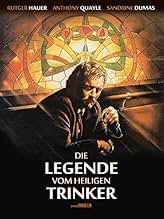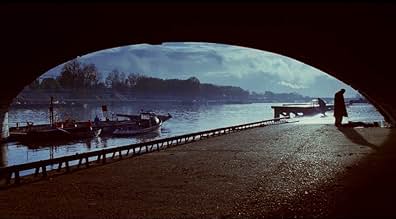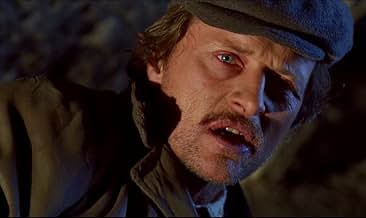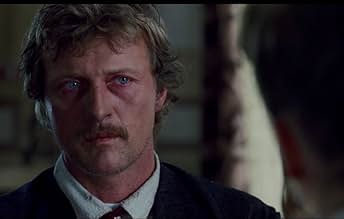IMDb RATING
7.1/10
2.4K
YOUR RATING
An alcoholic homeless man is given two hundred francs by a stranger, who requests that when he can he will return the money to Saint Therese in the cathedral.An alcoholic homeless man is given two hundred francs by a stranger, who requests that when he can he will return the money to Saint Therese in the cathedral.An alcoholic homeless man is given two hundred francs by a stranger, who requests that when he can he will return the money to Saint Therese in the cathedral.
- Director
- Writers
- Stars
- Awards
- 12 wins & 3 nominations total
Francesco Aldighieri
- Policeman
- (as Franco Aldighieri)
- Director
- Writers
- All cast & crew
- Production, box office & more at IMDbPro
Featured reviews
Dutch actor, Rutger Hauer plays the role of a Catholic-Pole and tramp - Andreas Kartack, living in penury in a a timeless Paris. He is approached by a generous dapper gentleman (English actor Anthony Quayle) who gives him 200 francs as long as he donates part of it to a local chapel. An ex-coal miner, in appearance, Kartack sports 'over the ears' wavy fair hair, rheumy eyes, a thin moustache and those tell-tale signs of the coal-mining trade - a rough tough job to say the least- a flat-cap and coal-dust underneath his fingernails. There are shots of him in a Polish mine-shaft and pit-village in an earlier life. He finds work, the company of women and companionship with fellow Poles but is let down by his alcoholism if not sense of stupidity. Based on Lemberg-born Jewish writer Joseph Roth's novel, why the film is poignant is hard to describe - perhaps relating to Slavs/East Europeans exiled from their homelands. The film has a rich spiritual feel, in fact it has that sense of art and spirituality seen in Dostoyevsky's novel, 'The Idiot' featuring the saintly epileptic Prince Leo or Tarkovsky's moving, 'Nostalghia' (1983). Paris seems like an organically glamourous city . For me, this is Hauer's finest performance after his role as the fair-haired French free spirit, Claude Maillot-Van Horn in Roeg's 'Eureka' (1983).
This tale of a tramp who is the recipient of the milk of human kindness but who finds it difficult to repay the goodness shown to him is typical of its director, Ermanno Olmi, but whereas other Olmi films deal with the common-place with an uncommon beauty this tale of the mystical is overtly simplistic. "The Legend of the Holy Drinker" is visually superb and we should expect nothing less from an Olmi picture but it is also very dry, very dull and very unevenly acted, (the partial dubbing of its international cast certainly doesn't help).
As the tramp Rutger Hauer staggers around looking a little too bewildered at what's happening to him and the supporting cast are fundamentally just bit players in his far from interesting story. The Stravinsky score also sits somewhat uneasily on proceedings. Some people think this is a masterpiece while others have simply dismissed it. Personally I found it a crashing bore.
As the tramp Rutger Hauer staggers around looking a little too bewildered at what's happening to him and the supporting cast are fundamentally just bit players in his far from interesting story. The Stravinsky score also sits somewhat uneasily on proceedings. Some people think this is a masterpiece while others have simply dismissed it. Personally I found it a crashing bore.
Andreas Kartak is one of life's dispossessed: a tramp, whiling away his days on the streets of Paris. One cold morning, a strange, distinguished gentleman offers him 200 francs, under the proviso that Kartak pay the money back- when he can- to Saint Therese in a nearby cathedral. So begins Kartak's quest to restore honor to his soul and meaning to his life by finding a way to return the money- after squandering it on copious amounts of wine and absinthe.
Based on Joseph Roth's posthumously released story of the same name, Ermanno Olmi's 'The Legend of the Holy Drinker' is a quiet, subtle drama that is moving and entertaining in equal measure. Olmi's restrained direction makes for a very interesting viewing experience. The film relies as much on tone and atmosphere as the screenplay- from Olmi and Tullio Kezich- to communicate the narrative and its' themes. The dialogue is sparse, but meaningful; no words are wasted, nor unnecessary speeches made.
The story is simple yet profound. Kartak's quest takes on a spiritual, epic dimension as he struggles to find his way back into society and to keep his pledge to the distinguished stranger. His character is well-rounded and believable, a man of honor thrust into a situation that would turn most dishonourable. He battles with himself and his principles, not to mention his memories of a past life long left behind; often losing those battles and finding solace in a bottle of cava. Kartak is a character many will see aspects of themselves in: a fascinating, flawed and thoroughly real creation.
The film is beautiful in terms of visuals. Dante Spinotti's cinematography has a rhythmic, mythical quality to it that suits the narrative perfectly. He captures the stark, cold charm of the Parisian streets with real verve and style. Gianni Quaranta's production design is striking and timeless. The film looks like it is set in the thirties, though the time period is never made definitive. His work is rich in detail and adds another dimension of authenticity to the proceedings. The same can be said for Jean-Jacques Caziot and Philippe Turlure's naturalistic set decoration and the inspired costume design from Anne-Marie Marchand.
Rutger Hauer stars as Kartak, delivering a moving, understated performance that is one of the finest he ever gave. His Kartak is a vulnerable man for whom honor and dignity mean the world, though his alcoholism has overtaken his principles. Hauer disappears into the character so thoroughly you genuinely forget you're watching an actor on screen.
Hauer was a performer of great versatility, intelligence and depth- not to mention charm- and he demonstrates that fact here. Though he will likely largely be remembered for his similarly powerful performance as Roy Batty in 'Blade Runner', his work as Kartak is truly magnificent and unaffectedly profound.
The supporting cast deliver generally admirable performances, with Anthony Quayle's as the distinguished stranger being a standout. He brings to the role the right amount of dignity and mystery that leaves an ineradicable impression on the viewer. Joseph De Medina also does good work as an obese hustler Kartak encounters, and Sandrine Dumas is utterly charming as Gaby, something of a love interest for Kartak; but poor post-dubbing of many of these secondary players diminishes the power of their performances, while also lessening the impact of their scenes.
'The Legend of the Holy Drinker' is an affecting film that tells a deceptively simple tale masterfully. As a character study, it works wonderfully, with Rutger Hauer delivering what could arguably be called the finest performance of his career. Director Ermanno Olmi has brought to audiences a memorable, thoughtful film that will surely be beloved by any who care to give it their time. Joseph Roth's stories are notoriously difficult to bring to the screen; this is easily the best adaptation of his work to date. 'The Legend of the Holy Drinker' is quiet, clever and utterly compelling.
Based on Joseph Roth's posthumously released story of the same name, Ermanno Olmi's 'The Legend of the Holy Drinker' is a quiet, subtle drama that is moving and entertaining in equal measure. Olmi's restrained direction makes for a very interesting viewing experience. The film relies as much on tone and atmosphere as the screenplay- from Olmi and Tullio Kezich- to communicate the narrative and its' themes. The dialogue is sparse, but meaningful; no words are wasted, nor unnecessary speeches made.
The story is simple yet profound. Kartak's quest takes on a spiritual, epic dimension as he struggles to find his way back into society and to keep his pledge to the distinguished stranger. His character is well-rounded and believable, a man of honor thrust into a situation that would turn most dishonourable. He battles with himself and his principles, not to mention his memories of a past life long left behind; often losing those battles and finding solace in a bottle of cava. Kartak is a character many will see aspects of themselves in: a fascinating, flawed and thoroughly real creation.
The film is beautiful in terms of visuals. Dante Spinotti's cinematography has a rhythmic, mythical quality to it that suits the narrative perfectly. He captures the stark, cold charm of the Parisian streets with real verve and style. Gianni Quaranta's production design is striking and timeless. The film looks like it is set in the thirties, though the time period is never made definitive. His work is rich in detail and adds another dimension of authenticity to the proceedings. The same can be said for Jean-Jacques Caziot and Philippe Turlure's naturalistic set decoration and the inspired costume design from Anne-Marie Marchand.
Rutger Hauer stars as Kartak, delivering a moving, understated performance that is one of the finest he ever gave. His Kartak is a vulnerable man for whom honor and dignity mean the world, though his alcoholism has overtaken his principles. Hauer disappears into the character so thoroughly you genuinely forget you're watching an actor on screen.
Hauer was a performer of great versatility, intelligence and depth- not to mention charm- and he demonstrates that fact here. Though he will likely largely be remembered for his similarly powerful performance as Roy Batty in 'Blade Runner', his work as Kartak is truly magnificent and unaffectedly profound.
The supporting cast deliver generally admirable performances, with Anthony Quayle's as the distinguished stranger being a standout. He brings to the role the right amount of dignity and mystery that leaves an ineradicable impression on the viewer. Joseph De Medina also does good work as an obese hustler Kartak encounters, and Sandrine Dumas is utterly charming as Gaby, something of a love interest for Kartak; but poor post-dubbing of many of these secondary players diminishes the power of their performances, while also lessening the impact of their scenes.
'The Legend of the Holy Drinker' is an affecting film that tells a deceptively simple tale masterfully. As a character study, it works wonderfully, with Rutger Hauer delivering what could arguably be called the finest performance of his career. Director Ermanno Olmi has brought to audiences a memorable, thoughtful film that will surely be beloved by any who care to give it their time. Joseph Roth's stories are notoriously difficult to bring to the screen; this is easily the best adaptation of his work to date. 'The Legend of the Holy Drinker' is quiet, clever and utterly compelling.
Olmi is one of Europe's last Old Masters in the art of film making. He is usually regarded as a belated neo-realist, but after you've seen "The Legend of the Holy Drinker", you will realize the label simply does not stick. This is a film about spirituality, about communion, one of the most deeply religious movies ever, whose only rivals might be Dreyer's "Ordet" or Bergman's rather pretentious "faith trilogy" ("Through a Glass Darkly", "Winter Light" and "The Silence"). However, you will not find Scandinavian mists or angst in Catholic Olmi's adaptation of the beautiful novella written, oddly enough, by a great Jewish novelist, Joseph Roth. Wine is a metaphor for life, and Paris is a metaphor for our urban world. In this symbolic universe, it takes a great actor to give flesh and blood to the character of Andreas, the holy drinker, a beggar endowed with an amazing sense of dignity. Rutger Hauer was the man for the job: this was his best performance: he was never better, and, to judge from the course his career has taken, I fear he will never be better than in this film. It is not a thriller, but it is thrilling. It takes its own leisurely pace, but goes very far, very deep indeed into the human soul. After so many insipid or unpalatable cinematic concoctions, treat yourself to this film: it truly is vintage stuff.
A great tale with a brillant Rutger Hauer and fatastic music by Igor Stravinsky!
Did you know
- TriviaRobert De Niro was approached for the role of Andreas Kartak, but he turned down the offer because he was not convinced about the project.
- Crazy credits"May God grant all of us, the drinkers, such a light and beautiful death". (Joseph Roth)
- ConnectionsFeatured in Het uur van de wolf: Rutger Hauer: Blond, blue eyes (2006)
- How long is The Legend of the Holy Drinker?Powered by Alexa
Details
- Release date
- Countries of origin
- Languages
- Also known as
- The Legend of the Holy Drinker
- Filming locations
- Production companies
- See more company credits at IMDbPro
Box office
- Gross worldwide
- $6,384
- Runtime
- 2h 8m(128 min)
- Color
- Sound mix
- Aspect ratio
- 1.85 : 1
Contribute to this page
Suggest an edit or add missing content











